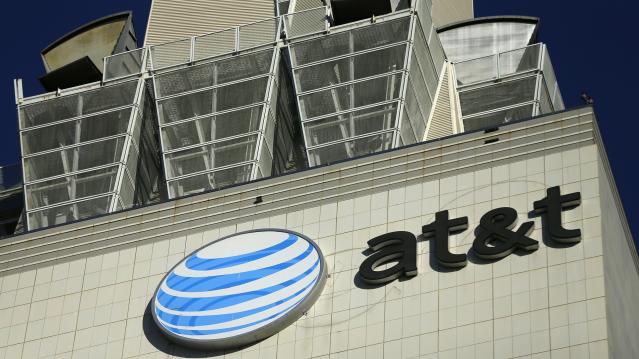FCC Slaps AT&T with $100 Million Fine for Throttling Internet Users

The FCC on Wednesday slapped AT&T hard, proposing a $100 million fine — the largest the agency has ever handed down — for what it described as the phone and broadband giant’s misleading customers about its “unlimited” data plans.
At issue is the practice of “throttling,” or limiting download and upload speeds for some users on those data plans.
Related: John Oliver Just Won the Net Neutrality Battle
AT&T’s throttling policy had been in place since 2011, according to an FCC statement, and it led to a barrage of complaints to the agency. AT&T targeted users who surpassed a certain data threshold over the course of a month, and consumer complaints argued that AT&T’s limiting of download speeds was directly at odds with the nature of the marketed “unlimited” plans.
AT&T, which is also pursuing government approval of its pending acquisition of DirecTV, says it will “vigorously dispute” the decision. In a statement, the company said that its practice is well documented and shared by many — if not all — service providers, and a legitimate method of managing their network’s resources. The FCC disagrees, claiming that AT&T violated transparency rules by falsely calling these plans unlimited.
"Broadband providers must be upfront and transparent about the services they provide,” said FCC Chair Tom Wheeler in a statement. “The FCC will not stand idly by while consumers are deceived by misleading marketing materials and insufficient disclosure."
Related: The Net Neutrality Debate Explained
AT&T has 30 days to respond before the FCC issues its final decision.
The Federal Trade Commission sued AT&T for $3.5 million in October last year, for the same alleged violation. That case is still ongoing.
Marco Rubio Says There’s No Proof Tax Cuts Are Helping American Workers

Sen. Marco Rubio (R-FL) told The Economist that his party’s defense of the massive tax cuts passed last year may be off base: “There is still a lot of thinking on the right that if big corporations are happy, they’re going to take the money they’re saving and reinvest it in American workers,” Rubio said. “In fact they bought back shares, a few gave out bonuses; there’s no evidence whatsoever that the money’s been massively poured back into the American worker.”
For Richer or Poorer: An Updated Marriage Bonus and Penalty Calculator

The Tax Policy Center has updated its Marriage Bonus and Penalty Calculator for 2018, including the new GOP-passed tax law. The tool lets users calculate the difference in income taxes a couple would owe if filing as married or separately. “Most couples will pay lower income taxes after they are married than they would as two separate taxpayers (a marriage bonus), but some will pay a marriage penalty," TPC’s Daniel Berger writes. “Typically, couples with similar incomes will be hit with a penalty while those where one spouse earns significantly more than the other will almost always get a bonus for walking down the aisle.”
Trump Administration Wants to Raise the Rent

Housing and Urban Development Secretary Ben Carson will propose increasing the rent obligation for low-income households receiving federal housing subsidies, as well as creating new work requirements for subsidy recipients. Some details via The Washington Post: “Currently, tenants generally pay 30 percent of their adjusted income toward rent or a public housing agency minimum rent not to exceed $50. The administration’s legislative proposal sets the family monthly rent contribution at 35 percent of gross income or 35 percent of their earnings by working 15 hours a week at the federal minimum wage -- or approximately $150 a month, three times higher than the current minimum.” (The Washington Post)
New Push for Capital Gains Tax Cut

Anti-tax activists in Washington are renewing their pressure on lawmakers to pass new legislation indexing capital gains taxes to inflation. The Hill provided an example of such indexing that Grover Norquist recently sent to Treasury Secretary Steven Mnuchin: “Under current policy, someone who made an investment of $1,000 in 2000 and sold it for $2,000 in 2017 would pay capital gains taxes on the $1,000 difference. But if capital gains were indexed, the investor would only pay taxes on $579, since $1,000 in 2000 would be equivalent to $1,421 in 2017 after adjusting for inflation.” Proponents of indexing say it’s just a matter of fairness, but critics claim that it would be just another regressive tax cut for the wealthy. Indexing would cost an estimated $10 billion a year in lost revenues. (The Hill)
Bernie Sanders to Propose Plan Guaranteeing a Job for Every American

Sen. Bernie Sanders (I-VT) is preparing to announce a plan for the federal government to guarantee a job paying $15 an hour and providing health-care benefits to every American “who wants one or needs one.” The jobs would be on government projects in areas such as infrastructure, care giving, the environment and education. The proposal is still being crafted, and Sanders’ representative said his office had not yet come up with a cost estimate or funding plan. Sen. Kirsten Gillibrand (D-NY) last week tweeted support for a federal jobs guarantee, but Republicans have long opposed such proposals, saying they would cost too much. (Washington Post)
